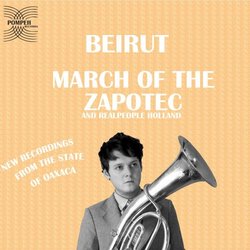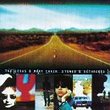| All Artists: Beirut Title: March of The Zapotec and Realpeople Holland Members Wishing: 1 Total Copies: 0 Label: Pompeii Records Original Release Date: 1/1/2009 Re-Release Date: 2/17/2009 Number of Discs: 2 SwapaCD Credits: 2 UPCs: 600197220122, 600197006627, 823566487722, 823566487821 |
Search - Beirut :: March of The Zapotec and Realpeople Holland
 | Beirut March of The Zapotec and Realpeople Holland
For the past year, Beirut has alternated between touring in support of 2007's much-lauded The Flying Club Cup and writing a wealth of new material. With no sense of a release in mind, bandleader Zach Condon recorded in any... more » |
Larger Image |
CD DetailsSynopsis
Product Description For the past year, Beirut has alternated between touring in support of 2007's much-lauded The Flying Club Cup and writing a wealth of new material. With no sense of a release in mind, bandleader Zach Condon recorded in any style that struck his fancy. Some early discussions about recording material for a film being shot in Mexico morphed into a new idea: What about finding a local band in a small city in Mexico, hiring them to play some new material, and recording the result? It was a sincere challenge every step of the way. Condon had to find the band, which he did through a bandmate's mother who has connections in Oaxaca. To communicate with the performers, he hired a translator, who had to be able to speak English, Spanish, as well as Zapotec, the band members' native language. From there, he flew down to Oaxaca, traveling a half-hour out of town to the tiny weaver village of Teotitlan del Valle, where he met the nineteen members of The Jimenez Band. The ensuing weeks of recording, rewriting, and relating are documented in a series of short films (to be released online as the release date for March of the Zapotec draws near). All well and good, but the six songs found on March of the Zapotec are only a part of what this release has become. Before recording as Beirut, Condon went by Realpeople for his bedroom recordings, and he has revived the name for the second half in this collection, Holland. As opposed to March of the Zapotec, Holland collects a series of songs conceived and completed at home. One song, Venice, appeared on a compilation by The Believer magazine, while My Night with the Prostitute from Marseille was on the Big Change digital-only charity compilation on iTunes. Together, this album-length double release represents the totality of Condon's work over the past year. March of the Zapotec is further testament toward the inventiveness and intimacy he creates as Beirut, a band which started as one person sounding like twelve, and has developed into a particular style and sound. No matter what inspirations jumpstart any one particular song, underlying it all is the realization that Condon is a singular artist creating an original sound. What may appear at first to be two disparate paths are in reality joined by Condon's ability to craft simple melodies that sound both unique and unforgettable. It would be a misconception for Beirut's sound to be considered a dabble in various styles, folk sounds, and music histories, because one could never confuse Condon's music for the original inspiration; all his songs on this release carry more in common with each other than they do their original source of inspiration. And whether he's being inspired by Balkan folk, French chanteuse, Mexican troubadour, '80s synth pop, or '90s house, the common thread remains Condon's ability to personalize the sound. March of the Zapotec marks the continuing emergence of a musician who has only shown an inkling of where he is headed. And while the road may be long, every stop along the way invites a new experience. Enjoy the latest. Similarly Requested CDs
|
CD ReviewsA mixed bag. It is a grower. southgate | New York, N.Y. | 02/17/2009 (4 out of 5 stars) "First of all, it is not an album but two EPs joined together. Maybe it is not exactly what you might have come to expect from this enviably talented young American artist. The first half features a Mexican funeral band and delivers oompah-ish brass and a strong dose of mariachi horns (featuring real Mexicans!). "It's a charmingly woozy picturesque postcard Mexico: full of inconsolably grieving mothers, carnivalesque town squares, bitter wives and death by bayonet"... like Jason Schwartzman in the "Darjeeling Limited", traveling across India, but seemingly locked within the world of "Where Do You To My Lovely?", the fixed-point at the heart of it all remains Condon's richly romantic, melancholy croon". - Uncut The second EP, "Holland", recorded by Condon under the moniker Realpeople (an early pre-Beirut alias) was recorded at home but seems like a great, reveals his more sombre Seventies synth side, featuring entirely unrelated, gently synthesized beats and keyboards and is significantly more successful. Two of the tracks from Holland have surfaced prior to this release - "My Night With The Prostitute From Marseille" appeared on a digitally released charity affair while "Venice" featured on a compilation given away by uber-hip US monthly "The Believer". "Venice" has a ghostly beauty, which makes you wish that Condon had fleshed out this group of songs into a whole album. And then there is the oddly uninspired, bizarre, inconsequential Euro-pop of "No Dice", upon which this collection unfortunately closes, which disappoints. This is a little weird, but it certainly shows a different aspect of Zach's musical personality and talent. It's happy, sad, intriguing and different. After repeated listenings, it will grow on you. And you will come to like it. The Flying Club Cup" 6 of 10 critics liked March of the Zapotec/Holland Brian J. Levine | New Bedford, MA USA | 02/19/2009 (3 out of 5 stars) "I've read 10 reviews of this album, 6 critics liked it, 4 didn't. Below is my attempt at aggregating all those reviews. This album is actually a double EP. The other EP is Realpeople's (Zach Condon's pre-Beirut name) Holland. Zach Condon (leader of Beirut) is starting to come across as a musical tourist. He goes someplace new, soaks in some music, becomes inspired and then writes his own music. March of the Zapotec was born from Condon's trip to Oaxaca Mexico where he heard some Mexican funeral music and ended up recording six songs with a local 19-piece band. Holland on the other hand is some lo-fi electronica that drew comparisons to the Magnetic Fields and Boards of Canada. The element that holds these two EPs together is Condon's voice. It's amazing. And strangely almost always described as a "croon", but whatever. Ultimately, it's solid work from an amazingly talented singer/musician. It could use a little more focus on writing songs instead of creating atmosphere. Also the critics who didn't like the EPs thought that it was uneven. And I get the feeling critics will really start ripping him if he doesn't settle on a style sooner or later." Uneven but excellent... Demetrius A. Armstrong | Huntington, WV USA | 03/08/2009 (4 out of 5 stars) "March of the Zapotec (and Realpeople: Holland) is comprised of two extended players spliced together to make one long player. This long player may or may not stand as Beirut's sole musical statement this year and it's a strange one. The first 6 tracks (or March of the Zapotec) are basically in indulgence of accordion harmonics with occasional structure (such as the outstanding "The Akara"). Beirut may be the only person making music in the popular sphere that can make the accordion (or something that resembles it) sound good but juxtaposing arrangements drenched with it next to a more immediate set of songs is a jolt and it makes for uneven listening. Those that appreciate strangeness will find value in the first set of arrangements but it'll be difficult to fairly compare them to the last group of songs on this album. The Realpeople: Holland songs (as far as listening pleasure) are the superior section of this EP suture. "My Wife, Lost in the Wild", "Venice" and "The Concubine" are three of the best songs Beirut has ever released and suggests deftness with electronic arrangements that was only hinted at on his first two albums. Frankly, this album was weighed back into excellent territory because of the strength of the last half and releasing the EPs together ensures more saturation of some of his best work, so this album was a good idea and it's a download that can stand next to his proper releases. Beirut's ambitious, that's for sure and his understated genius is hard to find elsewhere, that's why he caught on so generously a few years ago. He proves that musical vision is the key and not just trendy music equipment."
|

 Track Listings (6) - Disc #1
Track Listings (6) - Disc #1







